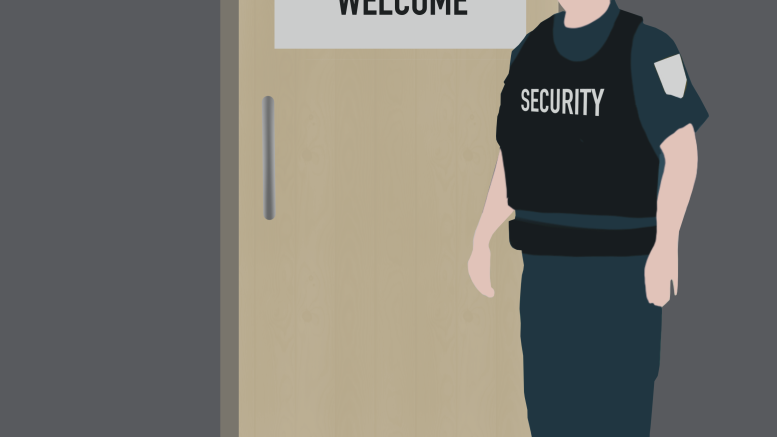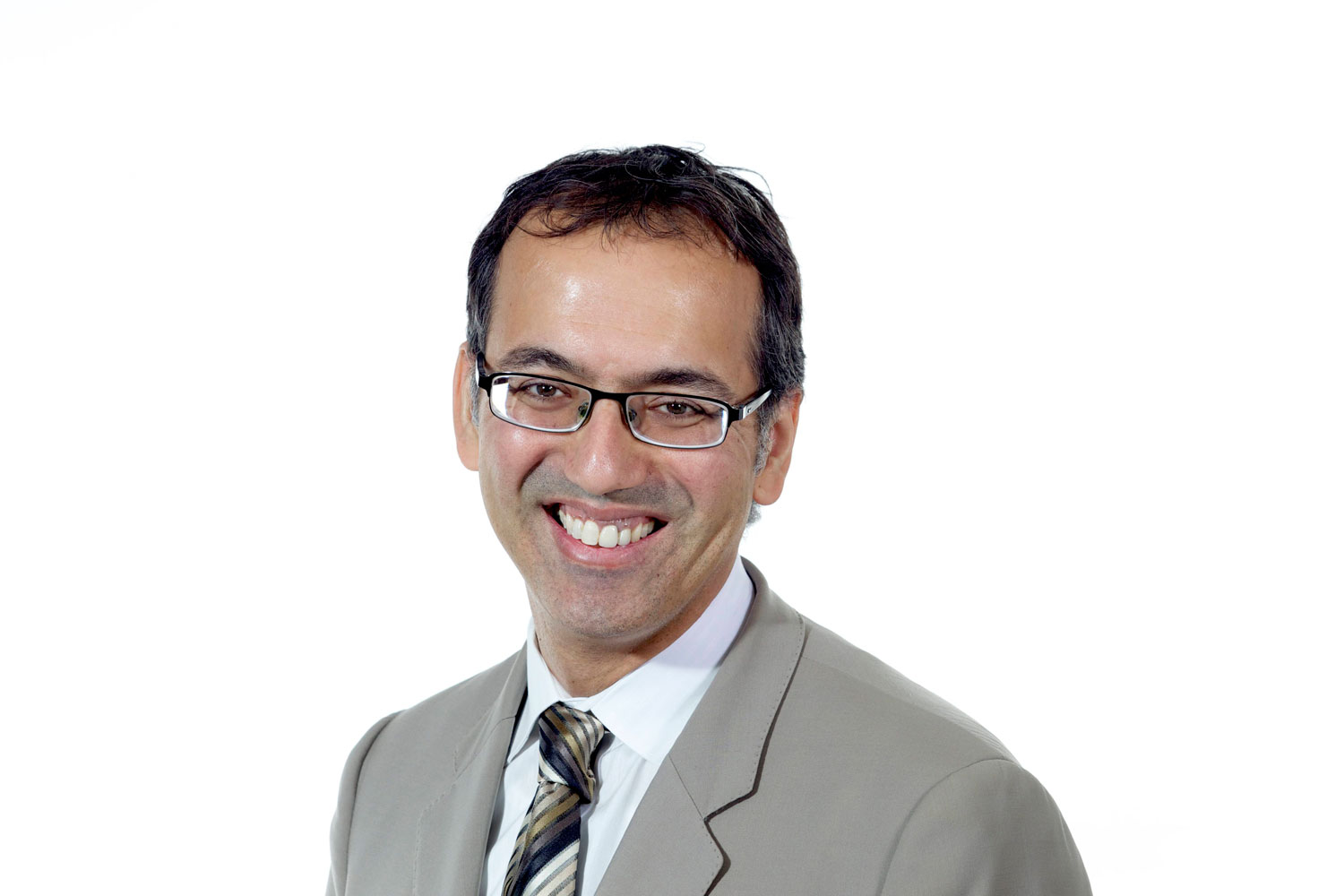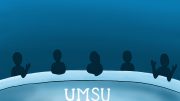UMSU and the University of Manitoba’s wilful and continuous ignoring of both the genocide of Palestinians, and the way the genocide has come to affect the U of M community locally, has come home to roost.
The U of M community is rightfully in an uproar after self-professed human rights expert Bassem Eid’s full-frontal Islamophobic and anti-Palestinian display at an event hosted by Students Supporting Israel U of M (SSI).
Although SSI advertised the event by forefronting Eid’s take on “what led to the recent war between Israel and Hamas,” Eid asserted the “ideology of the Muslims” was the core inhibitor to all three Abrahamic religions achieving peace during the question period.
Haneen Nakhleh and Belkis Elmoudi told the Manitoban they were accosted by security before they even entered the event, with one guard asking if Nakhleh would cause trouble because she had a keffiyeh. On top of that, a Palestinian teenager who briefly disrupted the talk by entering the event space — calling Eid a “disgrace” and accusing him of supporting ethnic cleansing before immediately leaving — was followed off campus by U of M security services.
In the days since, UMSU has published an overdue condemnation of Islamophobia and all forms of discrimination on its Instagram page, banned Eid from UMSU spaces and suspended SSI pending investigation. The U of M, for its part, has issued a similarly tardy mass email condemning Islamophobia and supporting UMSU’s decision to suspend SSI.
SSI has publicly whined about this on Instagram, opining that it should have been allowed to explain its side of the story while, ironically, failing to actually share any explanations.
It’s doubtful that SSI could justify inviting Eid to campus in the first place even if they did elucidate. Eid has collaborated with PragerU, a right-wing organization funded by the oil tycoon Wilks brothers. PragerU poses as an educational resource, but its modus operandi is largely to spread climate denialism, misinformation and Islamophobia at every turn.
So either SSI invited Eid knowing about his CV, or they didn’t know, which means they didn’t conduct even a cursory Google search on their guest and invited him anyway. SSI looks irresponsible at best and comfortable cozying up to right-wing quacks at worst.
SSI’s post suggested that, because their group represents “less than 0.2 per cent” of the global population, the decision to suspend them encourages a climate of antisemitism. The Jewish community is not a monolith, and suggestions that all Jewish people must be aligned with SSI are antisemitic. Jewish U of M faculty and students have even published writing critical of Israel in the Manitoban in recent months, so there really isn’t a justification for a U of M student group to erase or ignore the Jewish community’s diversity of opinions.
UMSU’s condemnation is belated, and an entirely reactive approach representative of the student union’s lack of forward thinking. Much like a parent mopping up their toddler’s vomit after feeding them a diet exclusively of chicken nuggets, gummy bears and genocide apologia.
Beyond bravely expressing disapproval for a form of hatred, what tangible action have UMSU’s and the university’s leadership been taking? They’ve been posing for plenty of pictures.
Vice-provosts Laurie Schnarr (students) and Tina Chen (equity) stood with Arij Al Khafagi and Elmoudi for a photo posted to Instagram. U of M president Michael Benarroch was noticeably absent, maybe because his brother was a primary emcee at the “Hear Our Voices” event in late January.
Schnarr’s presence in these photos constitutes its own comedic reward. I wrote in January criticizing an email on which Schnarr was the primary signatory, as the email crassly squeezed an acknowledgment of the police killing of Afolabi Stephen Opaso between New Year’s greetings and announcements about UMSU breakfasts.
Yes, UMSU and U of M are right to do the bare minimum and condemn Islamophobia. But there needs to be tangible action, along with acknowledgements that this came too late. Both parties’ performative displays ring particularly hollow in the wake of the U of M’s suspension of Al Khafagi, throughout which UMSU remained resolutely tight-lipped.
What is outrageous is not just that the U of M and UMSU have been negligent in preventing and addressing Islamophobia and anti-Palestinian racism on campus, it’s that the U of M has been complicit in contributing to that atmosphere while UMSU washed its hands of advocating for students affected by that complicity.
For instance, certain members of security services have been emboldened to posture and role play ‘80s comic book bad cops, threatening to arrest innocent Muslim students before following a Palestinian teenager out of their zone of authority. It’s entirely within the U of M’s jurisdiction to conduct some kind of inquiry into Islamophobic or anti-Palestinian bias latent in security services’ personnel, and yet what is it doing?
Well, it’s preparing to dialogue, according to Schnarr, in “upcoming series events.”
But, of course, doing more would require the U of M, and possibly even UMSU, to acknowledge the centrality of anti-Palestinian racism to this debacle. Security, in assuming Nakhleh’s keffiyeh — a symbol of solidarity with Palestinians — indicated she was a troublemaker made abundantly clear that there is an interplay between Islamophobia and anti-Palestinian sentiments here.
Condemning “all forms of discrimination” as the U of M and UMSU have done is important. But there’s a reason that, at times, we call for focused attention on specific kinds of racism. Stop Asian-American and Pacific Islander Hate, Black Lives Matter — we say these things when people in these specific communities suffer violence, because there are idiosyncratic forces that affect specific people in specific ways.
Eid’s outburst was Islamophobic, but he was also given a platform because there is a rampant problem with anti-Palestinian racism in the U of M community. The event was predicated on genocide denial, with Eid’s premising question being “what led to the war between Israel and Hamas?” repeating popular narratives that represent the genocide of Palestinians as a “war.”
To not acknowledge that basic element drains even these performative photo-ops of their relative value, like obnoxious tourists armed with selfie sticks photographing themselves against the backdrop of their own negligence.
In December, I wrote about the ways that I felt UMSU president Tracy Karuhogo’s administration’s silence on the genocide of Palestinians was part of the student union’s long tradition of prioritizing its executives’ interests over carrying out the union’s actual duties. I do think that UMSU’s silence on Palestinians’ plight communicated to groups like SSI that the community was hospitable to, if not entirely permissive of, anti-Palestinian racism.
It’s not even out of the ordinary for UMSU to comment on international affairs. As recently as 2020, UMSU voted to officially call for a “de-escalation of tensions in the Middle East” when the U.S. and Iran seemed poised for nuclear war. They also once adopted the International Holocaust Remembrance Association’s (IHRA) definition of antisemitism and stripped Students Against Israeli Apartheid of their UMSU status.
This is what leaves a sour taste in my mouth as I review both the U of M’s and UMSU’s statements on Eid’s talk. Imagine pressing your leadership on the question of whether or not they condemned misogyny in the wake of a highly publicized attack against women, only for them to respond that they condemn all instances of gender-based discrimination. You would be right to call that answer evasive.
When I reflect back on previous UMSU presidencies, I remember only serial humiliations, like then-UMSU president Jeremiah Kopp misusing $29,000 of the union’s funds on couches and food, or Sid Rashid’s 2010 administration allocating funds to create a special parking pass for UMSU executives.
We seem to have reached the great stain on Karuhogo’s administration’s professional vest. Although the student union had five months to model itself after its predecessors’ successes, it seems that Karuhogo and her team opted to book a space in the student union’s hall of fumbles.





